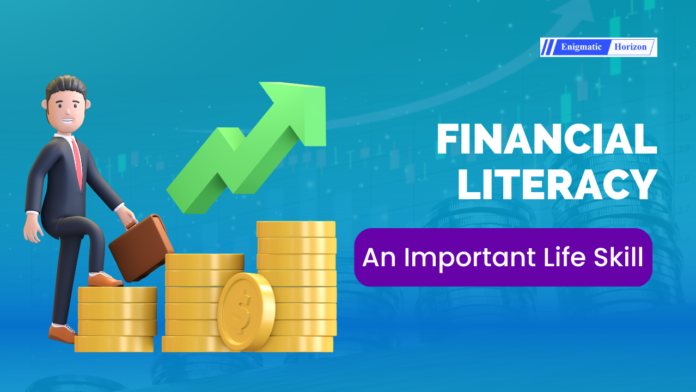Dr. Sanjib Das
“The number one problem in today’s generation and economy is the lack of financial literacy.” – Alan Greenspan, author
We spend and save a certain amount of money every day as we encounter various kinds of transactions. But how many of us know what that ‘certain’ amount should be and how to make a proper, flexible, and sound financial plan? Financial planning cannot be done efficiently if we do not have good financial literacy. A very rich person may also be financially illiterate and vice-versa.
A new idea in the context of contemporary economics is financial literacy. It refers to the capacity of an individual to handle money and other economic resources to make informed and efficient financial decisions. Initially, financial literacy was imparted in the form of financial knowledge by parents, peers, or financial experts. Nowadays, it covers a broad area of concern.
The key components of financial literacy as revealed by different studies include financial knowledge, financial behavior and financial attitude. Financial Knowledge includes interest calculation, interest on different loans, inflation, the relationship between risk and return, risk diversification, etc. Financial Behaviour includes the preparation and management of household budgets, meeting monthly expenses, evaluating household product selection, collecting information before purchasing financial products, keeping watch on personal financial affairs, setting long-term goals and striving to achieve them, affordability and bill payment habits, saving and borrowing routines, etc. Financial attitude is the psychological tendency manifested in a certain degree of agreement or disagreement concerning personal finance. It includes an attitude toward planning, saving, and spending money. Financial attitude is very important, as it includes a tendency to make financial plans, a desire to save money, and an interest in financial products or services.
Financial literacy modifies financial behavior, develops positive financial attitudes among people, and may lead them towards a better financial well-being position in life. The Consumer Financial Protection Bureau (CFPB) states, “financial well-being refers to a state of being where people can fully meet current and ongoing financial obligations, feel secure in their financial future, and make choices that allow them to enjoy life”. Financial literacy and financial well-being are positively correlated with each other. The higher the financial literacy, the better the financial well-being, and vice-versa.
Financial literacy helps one gain positive financial behavior and attitude, helps in appropriately managing money, reduces financial stress, and can lead to a better financial position in life. Financial literacy is essential for the effective financial inclusion and economic development of a nation.
The benefits of financial literacy begin with the individual and can extend to the economy and society.
- Benefits to the Individual: Financial literacy contributes towards more disposable income, and a better lifestyle for an individual through increased savings, efficient debt management, a better understanding of financial products, and a realistic approach towards financial goals.
- Benefits to the Economy: Well-informed consumers demand better quality products and services which create more competition, innovation, and quality products. Financially literate consumers are more likely to reduce the burden on the economy for losses and reduced activity. Increased savings and investments of the people promote economic growth and development.
- Benefits to the Society: Financial literacy leads to more financial inclusion as people would know how to access available financial products or services. They can better understand government schemes and policies, and access safe saving and investment avenues which greatly affect the financial future of the country.
George Carl, chairman of the National CPA Financial Literacy Commission finely quoted:
“Financial literacy is not an end in itself, but a step-by-step process. It begins in childhood and continues throughout a person’s life to retirement. Instilling the financial-literacy message in children is especially important because they will carry it for the rest of their lives.”
Surely financial literacy is essentially needed in everyone’s life, irrespective of socio-economic and demographic background. It is considered an important life skill in modern society. Keeping in view the growing importance of financial literacy in India, the National Centre for Financial Education (NCFE) was established in 2013 by the Government of India to promote financial literacy across the country for all sections of the population. Other organizations, such as SEBI, RBI, CRISIL, RGVN, NGOs, commercial banks, and educational institutions, are also playing their respective roles in this regard.
The financial literacy level of people can differ based on his/her socio-economic and demographic background, such as their place of residence, age, gender, marital status, education, occupation, income, religion, and social category. It also differs enormously between the developed and developing economies around the world. Financial literacy is essentially needed for all demographic segments of people and is considered to be an important life skill in modern society. The importance of financial literacy in India is even greater considering the low level of general literacy, the large section of the population outside the formal financial system, information asymmetry in the financial market, changes in economic policies, changes in the family structure, the advancement of information technology, the increased life expectancy of the citizens, etc. Financially literate people will contribute to the influx of economic activities and various products.
